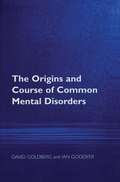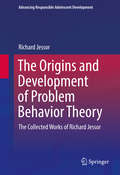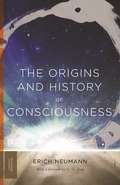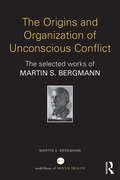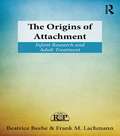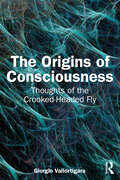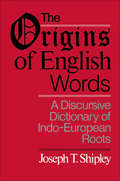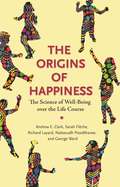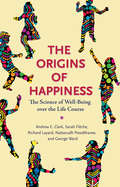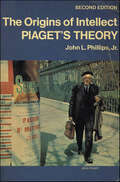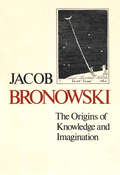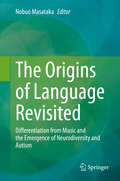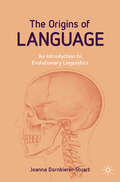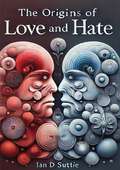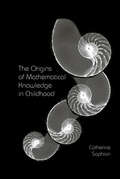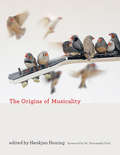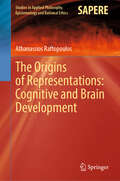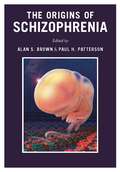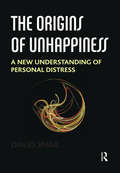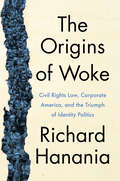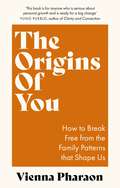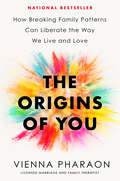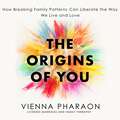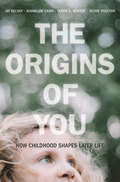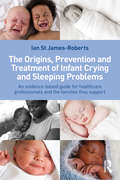- Table View
- List View
The Origins and Course of Common Mental Disorders
by Ian M Goodyer Prof David GoldbergWhy are some people more vulnerable to common mental disorders than others? What effects do genes and environments exert on the development of mental disorders? The Origins and Course of Common Mental Disorders describes the nature, characteristics and causes of common emotional and behavioural disorders as they develop across the lifespan, providing a clear and concise account of recent advances in our knowledge of the origins and history of anxious, depressive, anti-social, and substance related disorders. Combining a lifespan approach with developments in neurobiology, this book describes the epidemiology of emotional and behavioural disorders in childhood, adolescence and adult life. David Goldberg and Ian Goodyer demonstrate how both genes and environments exert different but key effects on the development of these disorders and suggest a developmental model as the most appropriate for determining vulnerabilities for psychopathology. Divided into four sections, the book covers: the nature and distribution of common mental disorders the biological basis of common disorders the human life cycle relevant to common disorders the developmental model. This highly readable account of the origins of emotional and behavioural disorders will be of interest to behavioural science students and all mental health professionals including psychiatrists, psychologists, social workers, nurses, and counsellors.
The Origins and Development of Problem Behavior Theory
by Richard JessorThis book, the first in a series of collected works, traces the evolution of Problem Behavior Theory from its inception to its current status as a widely used framework for understanding and addressing risky behavior in youth and young adults. The theory is explored from its beginnings as a study of deviant behavior and alcohol abuse in a tri-ethnic community through its expansion to include psychosocial aspects of development, risk and protective factors, and health behavior in the larger societal context of youth behavior. In its current form, Problem Behavior Theory constitutes an interdisciplinary approach to research personal and societal factors that are involved in both normative and problematic behavior. Chapters highlight the many contributions of the theory to social science and its potential for informing evidence-based intervention and prevention programs for youth and young adults. Topics featured in this book include: The Tri-Ethnic Community Study. The Socialization of Problem Behavior in Youth Study. The Young Adult Follow-up Study. The problem behavior syndrome. The cross-national generality of Problem Behavior Theory. Problem Behavior Theory and adolescent pro-social behavior. The Origins and Development of Problem Behavior Theory is a must-have resource for researchers/professors, clinicians, and related professionals as well as graduate students in social and developmental psychology, criminology/criminal justice, public health, social work, and related disciplines.
The Origins and History of Consciousness (Bollingen Series #760)
by Erich NeumannThe Origins and History of Consciousness draws on a full range of world mythology to show how individual consciousness undergoes the same archetypal stages of development as human consciousness as a whole. Erich Neumann was one of C. G. Jung's most creative students and a renowned practitioner of analytical psychology in his own right. In this influential book, Neumann shows how the stages begin and end with the symbol of the Uroboros, the tail-eating serpent. The intermediate stages are projected in the universal myths of the World Creation, Great Mother, Separation of the World Parents, Birth of the Hero, Slaying of the Dragon, Rescue of the Captive, and Transformation and Deification of the Hero. Throughout the sequence, the Hero is the evolving ego consciousness.Featuring a foreword by Jung, this Princeton Classics edition introduces a new generation of readers to this eloquent and enduring work.
The Origins and Organization of Unconscious Conflict: The Selected Works of Martin S. Bergmann
by Martin S. BergmannThe Origins and Organization of Unconscious Conflict provides a comprehensive set of contributions by Martin S. Bergmann to psychoanalytic theory, technique, and its applications. Following a general approach, Bergmann synthesizes Freud’s major contributions, the development of his thinking, the ramifications to present day psychoanalytic theory and practice and finally, discusses unresolved problems requiring further work. In these selected papers, profound meditations are offered on love and death, the leap from hysteria to dream interpretation in Freud’s intellectual development, the genetic roots of Psychoanalysis in the creative clash between Enlightenment and Romantic ideas, old age as a clinical and theoretical phenomenon, the death instinct as clinical controversy, and the interminable debate about termination in psychoanalysis and how to effect it. Crucial clinical and theoretical questions are constantly addressed and the challenges they pose will engage and enlighten the reader. Bergmann was a philosopher of mind as much as he is a psychoanalyst and the range and scope of the ideas in these selected papers is impressive, instructive and illuminating. Bergmann deals with psychoanalysis as a science, and with an ideology, referring to psychoanalysis as a "Weltanschauung", a philosophical basis for psychoanalytic theory. He presents an original, penetrating analysis of Freud’s inner struggle, about empirical research, validation and related to five other sciences; about irrational forces that constitute major motivators of human life, and require taking an existential position regarding their implications, the search for the meaning of one’s existence. The Origins and Organization of Unconscious Conflict is an exciting intellectual journey of the scientific and ideological aspects of psychoanalysis and the study of love. It will appeal to psychoanalysts, psychologists, philosophers and both undergraduate and postgraduate students studying in these fields, as well as anyone with an interest in mental health and human behaviour.
The Origins of Attachment: Infant Research and Adult Treatment (Relational Perspectives Book Series)
by Frank M. Lachmann Beatrice BeebeThe Origins of Attachment: Infant Research and Adult Treatment addresses the origins of attachment in mother-infant face-to-face communication. New patterns of relational disturbance in infancy are described. These aspects of communication are out of conscious awareness. They provide clinicians with new ways of thinking about infancy, and about nonverbal communication in adult treatment. Utilizing an extraordinarily detailed microanalysis of videotaped mother-infant interactions at 4 months, Beatrice Beebe, Frank Lachmann, and their research collaborators provide a more fine-grained and precise description of the process of attachment transmission. Second-by-second microanalysis operates like a social microscope and reveals more than can be grasped with the naked eye. The book explores how, alongside linguistic content, the bodily aspect of communication is an essential component of the capacity to communicate and understand emotion. The moment-to-moment self- and interactive processes of relatedness documented in infant research form the bedrock of adult face-to-face communication and provide the background fabric for the verbal narrative in the foreground. The Origins of Attachment is illustrated throughout with several case vignettes of adult treatment. Discussions by Carolyn Clement, Malcolm Slavin and E. Joyce Klein, Estelle Shane, Alexandra Harrison and Stephen Seligman show how the research can be used by practicing clinicians. This book details aspects of bodily communication between mothers and infants that will provide useful analogies for therapists of adults. It will be essential reading for psychoanalysts, psychotherapists and graduate students. Collaborators Joseph Jaffe, Sara Markese, Karen A. Buck, Henian Chen, Patricia Cohen, Lorraine Bahrick, Howard Andrews, Stanley Feldstein Discussants Carolyn Clement, Malcolm Slavin, E. Joyce Klein, Estelle Shane, Alexandra Harrison, Stephen Seligman
The Origins of Consciousness: Thoughts of the Crooked-Headed Fly
by Giorgio VallortigaraThe Origins of Consciousness challenges the dominant view that consciousness is an emergent property of the complex human brain.Based on his pioneering research on a variety of organisms, Vallortigara argues that the most basic forms of mental life do not require large brains, and that the neurological surplus observed in some animals such as humans is likely at the service of memory storage, not of the processes of thought or, even less, of consciousness. The book argues for a simple neural mechanism that can provide the crucial event that brings into effect the minimum condition for subjective experience. Implications of the hypothesis for the appearance of consciousness in different organisms are discussed, as well as links with a variety of fascinating human phenomena such as disorders of consciousness, tickling and visual illusions.Challenging widely accepted theories of consciousness, the book is a must-read for students and researchers of human and animal consciousness.
The Origins of English Words: A Discursive Dictionary of Indo-European Roots
by Joseph Twadell ShipleyThere are no direct records of the original Indo-European speech. By comparing the vocabularies of its various descendants, however, it is possible to reconstruct the basic Indo-European roots with considerable confidence. In The Origins of English Words, Shipley catalogues these proposed roots and follows the often devious, always fascinating, process by which some of their offshoots have grown.Anecdotal, eclectic, and always enthusiastic, The Origins of English Words is a diverting expedition beyond linguistics into literature, history, folklore, anthropology, philosophy, and science.
The Origins of Happiness: The Science of Well-Being over the Life Course
by Andrew Clark Richard Layard Sarah Flèche Nattavudh Powdthavee George WardA new perspective on life satisfaction and well-being over the life courseWhat makes people happy? The Origins of Happiness seeks to revolutionize how we think about human priorities and to promote public policy changes that are based on what really matters to people. Drawing on a range of evidence using large-scale data from various countries, the authors consider the key factors that affect human well-being, including income, education, employment, family conflict, health, childcare, and crime. The Origins of Happiness offers a groundbreaking new vision for how we might become more healthy, happy, and whole.
The Origins of Happiness: The Science of Well-Being over the Life Course
by Richard Layard Andrew E. Clark Sarah Flèche Nattavudh Powdthavee George WardWhat makes people happy? Why should governments care about people’s well-being? How would policy change if well-being was the main objective? The Origins of Happiness seeks to revolutionize how we think about human priorities and to promote public policy changes that are based on what really matters to people. Drawing on a uniquely comprehensive range of evidence from longitudinal data on over one hundred thousand individuals in Britain, the United States, Australia, and Germany, the authors consider the key factors that affect human well-being.The authors explore factors such as income, education, employment, family conflict, health, childcare, and crime—and their findings are not what we might expect. Contrary to received wisdom, income inequality accounts for only two percent or less of the variance in happiness across the population; the critical factors affecting a person’s happiness are their relationships and their mental and physical health. More people are in misery due to mental illness than to poverty, unemployment, or physical illness. Examining how childhood influences happiness in adulthood, the authors show that academic performance is a less important predictor than emotional health and behavior, which is shaped tremendously by schools, individual teachers, and parents. For policymakers, the authors propose new forms of cost-effectiveness analysis that places well-being at center stage.Groundbreaking in its scope and results, The Origins of Happiness offers all of us a new vision for how we might become more healthy, happy, and whole.
The Origins of Intellect: Piaget's Theory
by John L. Phillips Jr.The works published by the Swiss psychologist Jean Piaget and his associates during the past forty years constitute the largest repository of knowledge about the cognitive development of children that is available anywhere, and Piaget's general theory of intellectual development rivals, in scope and comprehensiveness, Freud's theory of personality developmentHere is a self-contained general summary of Piaget's theory, written at a relatively nontechnical level. It is suitable for use in a variety of courses in psychology and education -- child psychology, child development, educational psychology, learning, psychological systems, general psychology, and others. It will also interest professionals and educated laymen as a timely exposition of ideas that are attracting the attention of increasing numbers of American psychologists.In order to convey the complexities of the theory to readers who have had no previous contact with it, the author uses a number of unusual pedagogical devices. He first outlines the theory in an introduction that students can reread with increasing comprehension as they study the text. The main part of the book is an elucidation of the Piagetian periods of intellectual development, with enough illustrations of Piaget's research activities to give the theory meaning. The author frequently reproduces passages from Piaget's clinical observations with Piaget's interpretations deleted, so that the reader can assess his own understanding and better appreciate Piaget's style of inquiry. In an epilogue, the author discusses the educational implications of Piaget's work.
The Origins of Knowledge and Imagination
by Jacob BronowskiAdapted from a series of lectures by Bronowski that deals with one of the pivotal paradoxes that has plagued scientific thought.
The Origins of Language Revisited: Differentiation from Music and the Emergence of Neurodiversity and Autism
by Nobuo MasatakaThis book summarizes the latest research on the origins of language, with a focus on the process of evolution and differentiation of language. It provides an update on the earlier successful book, “The Origins of Language” edited by Nobuo Masataka and published in 2008, with new content on emerging topics.Drawing on the empirical evidence in each respective chapter, the editor presents a coherent account of how language evolved, how music differentiated from language, and how humans finally became neurodivergent as a species. Chapters on nonhuman primate communication reveal that the evolution of language required the neural rewiring of circuits that controlled vocalization. Language contributed not only to the differentiation of our conceptual ability but also to the differentiation of psychic functions of concepts, emotion, and behavior. It is noteworthy that a rudimentary form of syntax (regularity of call sequences) has emerged in nonhuman primates. The following chapters explain how music differentiated from language, whereas the pre-linguistic system, or the “prosodic protolanguage,” in nonhuman primates provided a precursor for both language and music. Readers will gain a new understanding of music as a rudimentary form of language that has been discarded in the course of evolution and its role in restoring the primordial synthesis in the human psyche. The discussion leads to an inspiring insight into autism and neurodiversity in humans. This thought-provoking and carefully presented book will appeal to a wide range of readers in linguistics, psychology, phonology, biology, anthropology and music.
The Origins of Language: An Introduction to Evolutionary Linguistics
by Joanna Dornbierer-StuartThis book offers an introduction to the multidisciplinary subject of evolutionary linguistics, which seeks to explain the biological origins of language and its subsequent development in humans. Roughly six million years ago, a branch of hominids from the forests of East Africa started to thrive in the drier environment created by the East African Rift System. A host of physical developments culminated in the brains of early humans increasing dramatically in size and cognitive power. Influenced by a unique and complex social organisation, communication signals became much more diverse and dependent on memory and learning mechanisms. But language is not only used to interact with our fellow beings. It is also closely connected to our thoughts. This makes language a biological, social, cultural and cognitive phenomenon all at once. What precise role did each of these aspects play in the emergence of language and how were they all coordinated to produce the most sophisticated communication system in the animal kingdom? The book aims to answer these questions and open up the fascinating world of evolutionary linguistics. It is not only aimed at scholars of linguistics, but also students from other disciplines (e.g., psychology, anthropology, evolutionary biology and cognitive science) who have an academic interest in language but may be approaching linguistics for the first time. In addition, the book should appeal to anyone with an interest in the workings of language in general, as well as advanced learners of English.
The Origins of Love and Hate
by Ian D Suttie Dr J. A. HadfieldThe Origins of Love and Hate by Ian D. Suttie offers a groundbreaking exploration of the psychological roots of human emotions, particularly focusing on love, hate, and their profound influence on relationships and mental health. Written in the early 20th century, this influential work challenges Freudian views of psychoanalysis by emphasizing the importance of emotional connection and social bonds in psychological development.Suttie’s central thesis is that human beings have a fundamental need for affection, which shapes emotional health from infancy through adulthood. He argues that early disruptions in nurturing relationships—particularly between mother and child—can lead to emotional conflict, producing feelings of rejection, hostility, or repressed hate. Suttie critiques Freud’s emphasis on instinctual drives, such as the death instinct, and instead highlights the role of love and attachment in shaping human behavior and personality.Throughout the book, Suttie provides insights into how unresolved emotional needs manifest in adult relationships, often causing psychological distress and alienation. His work foreshadows later developments in attachment theory and relational psychoanalysis, emphasizing the healing potential of empathy, love, and meaningful connection in therapeutic practice.Dr. J. A. Hadfield’s foreword contextualizes Suttie’s ideas within the broader field of psychoanalysis, acknowledging the originality and influence of his thought. The Origins of Love and Hate remains relevant to psychologists, therapists, and readers interested in human behavior, offering timeless insights into the emotional foundations of relationships.This work invites readers to reflect on how love, attachment, and rejection shape human experience and suggests that healing comes through restoring emotional bonds, making it an essential read for those interested in the psychology of emotions and relational well-being.
The Origins of Mathematical Knowledge in Childhood (Studies in Mathematical Thinking and Learning Series)
by Catherine SophianThis book examines the origins and development of children's mathematical knowledge. It contrasts the widely held view that counting is the starting point for mathematical development with an alternative comparison-of-quantities position. According to the comparison-of-quantities position, the concept of number builds upon more basic concepts of equality, inequality, and less-than and greater-than relations, which derive from comparisons between unenumerated quantities such as lengths. The concept of number combines these basic comparative concepts with the concept of a unit of measure, which allows one quantity to be described as a multiple of another. Sophian examines these alternative accounts of children's developing mathematical knowledge in the light of research: on children's counting; on their reasoning about continuous quantities such as length and area; on the development of the concept of unit; on additive and multiplicative reasoning; and on knowledge about fractions. In the closing chapters, Sophian draws out the developmental and the educational implications of the research and theory presented. Developmentally, the comparison-of-quantities position undermines the idea that numerical knowledge develops through domain-specific learning mechanisms in that it links numerical development both to physical knowledge about objects, which is the starting point for the concept of unit, and to the acquisition of linguistic number terms. Instructionally, the comparison-of-quantities perspective diverges from the counting-first perspective in that it underscores the continuity between whole-number arithmetic and fraction learning that stems from the importance of the concept of unit for both. Building on this idea, Sophian advances three instructional recommendations: First, instruction about numbers should always be grounded in thinking about quantities and how numbers represent the relations between them; second, instruction in the early years should always be guided by a long-term perspective in which current objectives are shaped by an understanding of their role in the overall course of mathematics learning; and third, instruction should be directly toward promoting the acquisition of the most general mathematical knowledge possible. The Origins of Mathematical Knowledge in Childhood is intended for researchers, professionals, and graduate students in developmental psychology, educational psychology, and mathematics education, and as a supplementary text for advanced undergraduate courses in cognitive development, educational psychology, and mathematics education.
The Origins of Musicality
by Henkjan HoningInterdisciplinary perspectives on the capacity to perceive, appreciate, and make music. Research shows that all humans have a predisposition for music, just as they do for language. All of us can perceive and enjoy music, even if we can't carry a tune and consider ourselves “unmusical.” This volume offers interdisciplinary perspectives on the capacity to perceive, appreciate, and make music. Scholars from biology, musicology, neurology, genetics, computer science, anthropology, psychology, and other fields consider what music is for and why every human culture has it; whether musicality is a uniquely human capacity; and what biological and cognitive mechanisms underlie it. Contributors outline a research program in musicality, and discuss issues in studying the evolution of music; consider principles, constraints, and theories of origins; review musicality from cross-cultural, cross-species, and cross-domain perspectives; discuss the computational modeling of animal song and creativity; and offer a historical context for the study of musicality. The volume aims to identify the basic neurocognitive mechanisms that constitute musicality (and effective ways to study these in human and nonhuman animals) and to develop a method for analyzing musical phenotypes that point to the biological basis of musicality. Contributors Jorge L. Armony, Judith Becker, Simon E. Fisher, W. Tecumseh Fitch, Bruno Gingras, Jessica Grahn, Yuko Hattori, Marisa Hoeschele, Henkjan Honing, David Huron, Dieuwke Hupkes, Yukiko Kikuchi, Julia Kursell, Marie-Élaine Lagrois, Hugo Merchant, Björn Merker, Iain Morley, Aniruddh D. Patel, Isabelle Peretz, Martin Rohrmeier, Constance Scharff, Carel ten Cate, Laurel J. Trainor, Sandra E. Trehub, Peter Tyack, Dominique Vuvan, Geraint Wiggins, Willem Zuidema
The Origins of Representations: Cognitive and Brain Development (Studies in Applied Philosophy, Epistemology and Rational Ethics #73)
by Athanassios RaftopoulosThis book provides an account of the origins and development of iconic and symbolic representations in our evolutionary lineage, the hominis, and of the cognitive capacities and brain structures that support such a development. At first, it introduces the three basic types of signs, such as indices, icons, and symbols, used by most animals, including apes and hominins, for communicating and interacting with the environment, and discusses the differences among them. In turn, it explains the evolution from non-representational indices to iconic, first, and then symbolic representations in terms of the evolution of the cognitive capacities in our lineage. The main emphasis is on the cognitive capabilities that support the use of these types of signs, such as attention, executive functions, and working memory, among others. The discussion centers on determining these capacities, and how and why these capacities evolved in the phylogenesis of hominids. Further, evidence from psychology and neuroscience are used to shed light on the development of these capacities in hominins, together with knowledge about the basic brain structures supporting these capacities, such as the prefrontal cortex, and their development at the ontogenetic and phylogenetic scales. All in all, this book offers a theory of the development of our representational arsenal from its beginnings characterized by simple signs to its modern form made of highly abstract symbols.
The Origins of Schizophrenia
by Alan Brown Paul PattersonThe Origins of Schizophrenia synthesizes key findings on a devastating mental disorder that has been increasingly studied over the past decade. Advances in epidemiology, translational neuroscience technology, and molecular and statistical genetics have recast schizophrenia's neurobiological nature, identifying new putative environmental risk factors and candidate susceptibility genes. Providing the latest clinical and neuroscience research developments in a comprehensive volume, this collection by world-renowned investigators answers a pressing need for balanced, thorough information, while pointing to future directions in research and interdisciplinary collaboration.The book, featuring a foreword by Robert Freedman, M.D., thoroughly examines these topics from the vantage points of epidemiologic, clinical, and basic neuroscience approaches, making it an essential resource for researchers in psychiatry, psychology, and neuroscience and for clinical mental health professionals.
The Origins of Unhappiness: A New Understanding of Personal Distress
by David SmailIt is the main argument of this book that emotional and psychological distress is often brought about through the operation of social-environmental powers which have their origin at a considerable distance from those ultimately subjected to them. On the whole, psychology has concerned itself very little with the field of power which stretches beyond our immediate relations with each other, and this has led to serious limitations on the explanatory power of the theories it has produced. To illustrate this, typical cases of patient distress in the 1980s are examined. The decade when the right-wing of politics proclaimed there was no such thing as society gave rise to psychological distress across social classes, as long-standing societal institutions were dismantled. This is as much a work of sociology, politics, and philosophy, as it is of psychology. Fundamentals of an environmental understanding of distress are outlined. A person is the interaction of a body with the environment.
The Origins of Woke: Civil Rights Law, Corporate America, and the Triumph of Identity Politics
by Richard HananiaRichard Hanania has emerged as one of the most talked-about writers in the nation, and in this book, he puts forward a stunning new theory about the culture war that could turn our debates upside down. Richard Hanania has come out of nowhere to become one of the best-known writers in the nation in the last few years. In this book, he directs his attention to the culture war that has driven society apart and presents a stunning new theory about what is going on.In a nation nearly-evenly split between conservatives and liberals, the left dominates nearly all major institutions, including universities, the government, and corporate America. Hanania argues that this is as much a legal requirement as it is an issue of one side triumphing in the marketplace of ideas. Culture has its own independent force, but the state has, since the 1960s, been putting its thumb on the scale. This book answers many of the puzzling questions about modern society, such as:• Why does more and more of life seem like a competition to see who is the most oppressed?• Who is really behind the sudden proliferation of woke ideas?• How did ideas that seem so intellectually bankrupt achieve hegemony over elite culture?• Which laws and regulations have helped the left rise to power everywhere?• How did workplaces come to be the main enforcers of political ideology?• When and how did Pakistanis, Samoans, and Koreans all become the same "race" (AAPI)? • Why did America become so obsessed with inequalities based on race but not religion? For those angry about wokeness and what it has done to American institutions, this book offers concrete suggestions regarding policies that can move us back to being a country that emphasizes merit, individual liberty, and color-blind governance.
The Origins of You: How Breaking Family Patterns Can Liberate the Way We Live and Love
by Vienna PharaonFrom licensed therapist and popular Instagram relationship expert Vienna Pharaon comes a profound guide to understanding and overcoming wounds from your family of origin - the foundation of how we relate to others, ourselves, and the world around us.None of us had a perfect childhood; we are all carrying around behaviors that don't serve us - and may in fact be hurting us. But it doesn't have to be that way, says licensed Marriage and Family Therapist Vienna Pharaon. Our past might create our patterns, but we can change those patterns for the better with the right tools.In THE ORIGINS OF YOU, Pharaon has unlocked a healing process to help us understand our family of origin - the family and framework we grew up within - and examine what worked (and didn't) in that system. Certain dysfunctions (or "wounds") in that family of origin will manifest in our adult life in surprising ways, from work challenges to interpersonal struggles. But when armed with the knowledge about our past, we can rewire our programming to meaningfully improve our relationships and our lives.It doesn't matter whether you've been in therapy for decades, or whether therapy isn't for you. It doesn't matter if you have plenty of memories from childhood, or struggle to remember anything at all. All that matters is your willingness to look inside yourself, and your determination to find a new way forward. Complete with guided introspection, personal experiences, client stories, frameworks for having difficult conversations, and worksheets to complement each chapter, THE ORIGINS OF YOU will teach you how your family can both build you up and break you down - and how you can heal yourself for good.
The Origins of You: How Breaking Family Patterns Can Liberate the Way We Live and Love
by Vienna PharaonFrom licensed therapist and popular Instagram relationship expert Vienna Pharaon (@mindfulmft, +631K followers) comes a profound guide to understanding and overcoming wounds from your Family of Origin—the foundation of how we relate to others, ourselves, and the world around us.None of us had a perfect childhood; we are all carrying around behaviors that don&’t serve us—and may in fact be hurting us. But it doesn&’t have to be that way, says licensed marriage and family therapist Vienna Pharaon. Our past might create our patterns, but we can change those patterns for the better...with the right tools.In The Origins of You, Pharaon has unlocked a healing process to help us understand our Family of Origin—the family and framework we grew up within—and examine what worked (and didn&’t) in that system. Unhealed pain (or &“wounds&”) in that Family of Origin will manifest in our adult behaviors in surprising ways, from work challenges to interpersonal struggles. But the good news: armed with the knowledge about our past, we can actually rewire our programming to meaningfully improve our relationships and our lives, right now and in the future.It doesn&’t matter whether you&’ve been in therapy for decades, or whether therapy isn&’t for you. It doesn&’t matter if you have loads of memories from childhood, or struggle to remember anything at all. What matters is your willingness to look inside yourself, and your determination to find a new way forward. Complete with guided introspection, personal experiences, client stories, frameworks for having difficult conversations, and worksheets to complement each chapter, The Origins of You will teach you how to break family patterns and help you liberate the way you live and love.
The Origins of You: How Breaking Family Patterns Can Liberate the Way We Live and Love
by Vienna PharaonFrom licensed therapist and popular Instagram relationship expert Vienna Pharaon comes a profound guide to understanding and overcoming wounds from your family of origin - the foundation of how we relate to others, ourselves, and the world around us.None of us had a perfect childhood; we are all carrying around behaviors that don't serve us - and may in fact be hurting us. But it doesn't have to be that way, says licensed Marriage and Family Therapist Vienna Pharaon. Our past might create our patterns, but we can change those patterns for the better with the right tools.In THE ORIGINS OF YOU, Pharaon has unlocked a healing process to help us understand our family of origin - the family and framework we grew up within - and examine what worked (and didn't) in that system. Certain dysfunctions (or "wounds") in that family of origin will manifest in our adult life in surprising ways, from work challenges to interpersonal struggles. But when armed with the knowledge about our past, we can rewire our programming to meaningfully improve our relationships and our lives.It doesn't matter whether you've been in therapy for decades, or whether therapy isn't for you. It doesn't matter if you have plenty of memories from childhood, or struggle to remember anything at all. All that matters is your willingness to look inside yourself, and your determination to find a new way forward. Complete with guided introspection, personal experiences, client stories, frameworks for having difficult conversations, and worksheets to complement each chapter, THE ORIGINS OF YOU will teach you how your family can both build you up and break you down - and how you can heal yourself for good.
The Origins of You: How Childhood Shapes Later Life
by Jay Belsky Terrie E. Moffitt Avshalom Caspi Richie PoultonAfter tracking the lives of thousands of people from birth to midlife, four of the world’s preeminent psychologists reveal what they have learned about how humans develop. Does temperament in childhood predict adult personality? What role do parents play in shaping how a child matures? Is day care bad—or good—for children? Does adolescent delinquency forecast a life of crime? Do genes influence success in life? Is health in adulthood shaped by childhood experiences? In search of answers to these and similar questions, four leading psychologists have spent their careers studying thousands of people, observing them as they’ve grown up and grown older. The result is unprecedented insight into what makes each of us who we are. In The Origins of You, Jay Belsky, Avshalom Caspi, Terrie Moffitt, and Richie Poulton share what they have learned about childhood, adolescence, and adulthood, about genes and parenting, and about vulnerability, resilience, and success. The evidence shows that human development is not subject to ironclad laws but instead is a matter of possibilities and probabilities—multiple forces that together determine the direction a life will take. A child’s early years do predict who they will become later in life, but they do so imperfectly. For example, genes and troubled families both play a role in violent male behavior, and, though health and heredity sometimes go hand in hand, childhood adversity and severe bullying in adolescence can affect even physical well-being in midlife. Painstaking and revelatory, the discoveries in The Origins of You promise to help schools, parents, and all people foster well-being and ameliorate or prevent developmental problems.
The Origins, Prevention and Treatment of Infant Crying and Sleeping Problems: An Evidence-Based Guide for Healthcare Professionals and the Families They Support
by Ian St James-RobertsBabies who cry a lot, or are unsettled in the night, are common sources of concern for parents and, consequently, costly problems for health services. In this book, Ian St James-Roberts summarises the evidence concerning infant crying and sleeping problems to provide a new evidence-based approach to these common challenges for parents and health services. The book begins by distinguishing between infant and parental parts of the problems and provides guidelines for assessing each issue. Topics covered include: • the pros and cons of 'infant-demand' versus 'limit-setting' forms of parenting • causes of infant 'colicky' crying and night waking• effects of night-time separations on infant attachments• interventions such as swaddling, herbal remedies, and 'controlled crying.' Since there is now firm evidence that parents' vulnerabilities and cultural backgrounds affect how problems are defined and guidance is acted upon, and that parents who wish to do so can reduce infant crying and unsettled night waking, social factors are considered alongside medical issues. Translating research evidence into practical tools and guidance, The Origins, Prevention and Treatment of Infant Crying and Sleeping Problems will be essential reading for a wide range of healthcare professionals including mental health staff, social workers, midwives, health visitors, community physicians and paediatricians.
